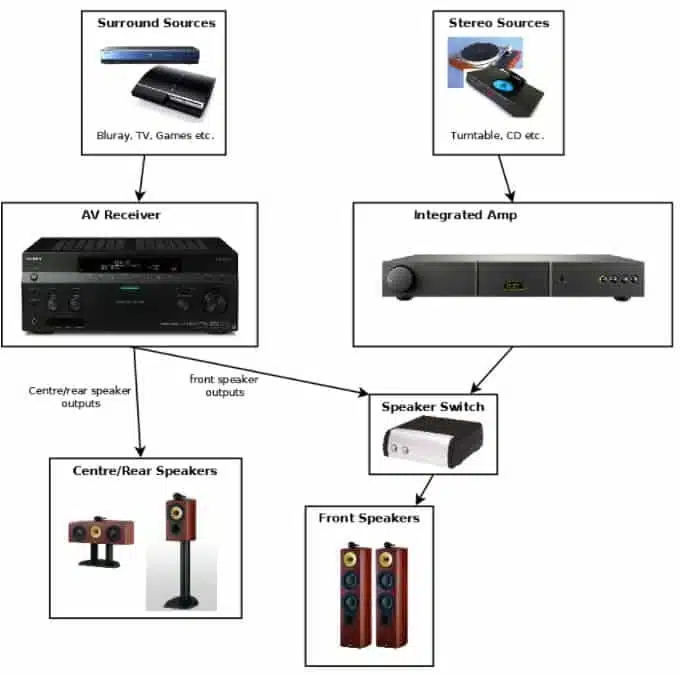Within the vast and complex universe of high-fidelity audio, pre outs (preamplifier outputs) have carved a special niche for themselves. To a lot of people, these unassuming connectors might seem insignificant and even unnecessary, but they can play a key role in transforming your listening experience. Whether you are an audiophile pursuing the best possible sound, a casual music lover who wants to ensure there is some headway for upgrades in future, or just someone in between, understanding pre-outs is indispensable and can be helpful in many instances. So let’s start with the basics.
What are Pre Outs and Why Do They Exist
Found on various audio devices, including integrated amplifiers, receivers and preamplifiers, pre outs are output jacks that resemble regular 1/4th inch RCA connectors. They provide a clean, unprocessed audio signal that can be sent to external components like power amplifiers or active speakers. The signal coming out of a pre out bypasses the internal amplification stage of the source device, allowing users to utilise a separate, dedicated amplifier or powered speakers for optimal sound reproduction.
The primary purpose of pre outs is to facilitate a modular and upgradable audio system. By separating the preamplification and amplification stages, you gain greater flexibility in tailoring your setup to your specific needs and preferences. This separation also allows you to mix and match components from different manufacturers, creating a customised, high-performance audio ecosystem that can be spread across multiple rooms.
How Pre Outs Work and Where They’re Typically Found
It's essential to understand what role pre outs play within the audio chain to fully appreciate their significance. The audio chain is the path that an audio signal takes from its source, such as a CD player or streaming device, to the final output, typically speakers or headphones. In a traditional audio setup, the source device sends its signal to an integrated amplifier or receiver, which combines the preamplification and amplification stages. The preamplifier section processes and amplifies the low-level audio signal, while the power amplifier section further amplifies the signal to a level suitable for driving speakers or headphones.
Pre outs come into play when you want to separate these two stages. Instead of sending the amplified signal directly to speakers, the preamplifier output is routed to an external power amplifier or active speakers via the pre outs. This external amplifier then takes over the responsibility of further amplifying the signal to the desired level, ensuring optimal power delivery and sound quality.
Preouts can be found on a variety of audio devices. Integrated amplifiers combine a preamplifier and power amplifier in a single chassis and often feature pre outs for connecting external amplifiers or powered speakers. Dedicated preamplifiers are designed solely for signal processing and amplification, providing preouts as their primary outputs. Home theatre AV receivers, which combine multiple audio and video components, typically offer pre outs for connecting external amplifiers to drive additional speaker channels or subwoofers.
By incorporating pre outs into your audio chain, you gain the ability to upgrade individual components without overhauling your entire system. For instance, you can start with an entry-level integrated amplifier and later upgrade to a higher-end external power amplifier or active speakers, leveraging the pre outs to enhance your system's performance without discarding your existing components.
Also see: What is the function of Pre-Out port in an AV Receiver?
Using Pre Outs in a Typical Audio Setup
In a typical audio setup, pre outs are utilised to connect your source device (such as an integrated amplifier, receiver, or preamplifier) to external components like power amplifiers or active speakers. Here's how you can incorporate pre outs into your audio chain.
- Identify the preout connections: Locate the preout jacks on your source device. These are typically labelled as "Pre Out," "Pre Amp Out," or something similar. They may be RCA or XLR connectors, depending on your equipment.
- Connect the preouts: Using high-quality audio cables (RCA or XLR, matching the connectors on your devices), connect the preouts on your source device to the inputs of your external power amplifier or active speakers.
- Power on the components: Turn on your source device first, followed by the external amplifier or active speakers. This order is important to avoid potential damage from signal surges.
- Configure the input settings: If your external amplifier or active speakers have multiple input options, ensure that you select the appropriate input corresponding to the preout connections you've made.
- Adjust volume and settings: Start with the volume on your source device set to a low level. Once everything is connected and powered on, gradually increase the volume to your desired listening level. You may also need to adjust any additional settings, such as speaker configuration or bass management, depending on your specific setup.
If your audio setup includes multiple subwoofers or subwoofers with multiple inputs, pre outs can be especially useful. Here's how you can handle multiple subwoofer inputs with pre outs.
- Identify the subwoofer preout: Many source devices, like receivers or preamplifiers, have a dedicated preout specifically for connecting a subwoofer. This pre out may be labelled as "Sub Out," "LFE Out," or something similar.
- Use a Y-splitter cable: If your source device has only one subwoofer preout but you have multiple subwoofers, you can use a Y-splitter cable. This cable splits the single preout signal into two separate outputs, allowing you to connect both subwoofers.
- Adjust subwoofer levels: Most subwoofers have a level control or gain adjustment. Once connected to the pre out, you'll need to balance the output levels of each subwoofer to achieve the desired bass response in your listening area.
- Consider a dedicated sub amplifier: For larger or more complex setups with multiple subwoofers, you may want to consider using a dedicated subwoofer amplifier. In this case, you would connect the subwoofer preout from your source device to the input of the subwoofer amplifier, and then connect the outputs of the subwoofer amplifier to each of your subwoofers.
As with most things, there are upsides and downsides to everything and this applies to pre outs as well. Let’s weigh our options so you have the right perspective to make an informed decision.
The Pros and Cons of Pre Outs
Incorporating preouts often requires purchasing separate preamplifiers and power amplifiers, which can be more expensive than an integrated amplifier solution. Separating the audio chain into multiple components can add complexity to your setup, requiring more cables and potentially introducing noise or interference if not properly configured. Dedicated preamplifiers and power amplifiers may require more physical space in your audio rack or room than an integrated amplifier.
On the other hand, pre outs allow you to build a modular audio system that can be upgraded over time, preserving your initial investment while enhancing performance. By separating the preamplification and amplification stages, you can potentially achieve better sound quality with lower distortion and more dynamic range. External amplifiers, especially those designed for high-end systems, can deliver more power to your speakers, resulting in a more immersive and impactful listening experience. Lastly, pre outs enable you to mix and match components from different manufacturers, tailoring your system to your specific preferences and needs.
Should I Use a Pre Out?

Image credit - boomspeaker.com
Pre outs are ideal for audiophiles, home theatre enthusiasts and anyone seeking to build a high-performance, modular audio system. They allow you to separate the preamplification and amplification stages, enabling the use of dedicated external amplifiers or active speakers for improved sound quality, higher power output and greater flexibility in mixing and matching components.
However, pre outs may not be necessary for those with more modest setups or those prioritising simplicity over customisation. Casual listeners or those with space constraints might find an integrated amplifier solution more practical, as it eliminates the need for additional components and cabling. Ultimately, whether to incorporate preouts depends on your audio priorities, budget and willingness to invest in a more complex but potentially superior audio chain.







